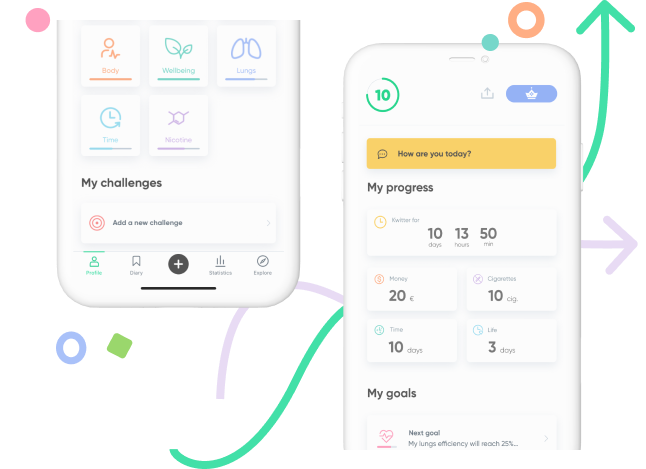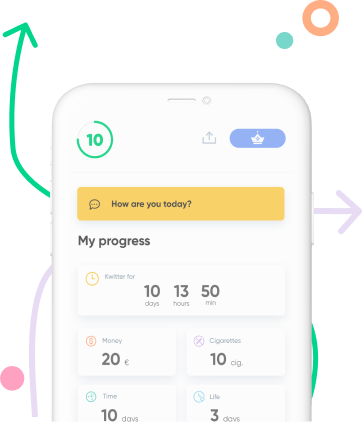May 21, 2019
Tips
3 symptoms of smoking cessation and our solutions
The side effects of quitting smoking are often a barrier for smokers. Kwit gives you all the information you need to understand them and overcome them to ensure successful cessation!
Quitting smoking implies that you stop taking nicotine. Although the substance leaves no trace in the blood after a few days, the lack of it leads to addiction-related disorders. They are both psychological and physical. The time needed for the symptoms to dissipate might be long. Here, we will look at 3 of these symptoms (weight gain, craving and demotivation), and provide concrete solutions.
Weight gain, symptoms and solutions
For most people, weight gain is inevitably linked to smoking cessation. In fact, for a long time, tobacco ads have insisted on the appetite suppressant aspect. In the same way, some said that it would be expected that smoking cessation would lead to weight gain, varying from 3 to 5 kg approximately! Well, this statement is not entirely true, because one-third of people do not gain weight. In other cases, the body will eventually regulate itself, provided that the person follows a balanced diet.
To avoid weight gain during the withdrawal period, we suggest the following solutions:
Eat fruit, as this reduces the risk of relapse. They make the taste of tobacco unpleasant and serve as an appetite suppressant.
Sleep, especially during the first few days when the lack is extreme. We know the proverb « who sleeps, suppers » and in this case, rest takes the place of food.
Eat slowly, as a matter of fact, this might this will give you a stronger feeling of satiety. Plus, this is the best time to rediscover the flavours you lost during the smoking period! Try to avoid sweet drinks; water is better for you.
Exercise regularly but not too intensively.
Craving, symptoms and solutions
When you are addicted, the lack is too intense, especially within the first days of the treatment, to the point where you compulsively seek out your drug, tobacco, by any means possible. This is called craving. At this point, it is essential to know that this craving only lasts 3 to 6 minutes. Then, how can you not give in to the relapse during these few minutes and resist this impulse? Kwit gives you some solutions.
Use coping strategies, a term defined by Lazarus and Folkman as « the set of ever-changing cognitive and behavioural efforts that the individual makes to respond to specific internal or external demands, which are assessed as very strong and that exceed the individual's adaptive resources ».
Besides, cognitive behavioural therapies (CBTs) are effective in controlling craving. It is necessary to control stimuli and know the situations that trigger the desire to smoke to avoid or substitute them.
In practice and as an example, be physically active for 5 minutes. This leads to a reduction in the craving sensation identical to that produced with a nicotine substitute!
Chew a piece of gum or sugar-free mint candy.
Drink a large glass of fresh water.
Breathe slowly and deeply, several times in a row.
Eat fruit.
Take a shower
Take a long walk in nature!
Decreased motivation
Decreased motivation may lead to relapse and abandonment of smoking cessation. Indeed, the goals you have set for yourself and its positive effects suddenly seem too low compared to cigarette deprivation and its pleasures. In short, you are in a phase of discouragement. Then it's time to read our blog article on the steps to get motivated!
It is not always easy to rebuild motivation by oneself, so a little external help is often needed. Do not hesitate to tell those around you that you may need them at times, to boost your motivation and help you hold on.
Follow our advice so that you are armed to resist the temptation to smoke. Overcome these temporary withdrawal symptoms and reach your goal of a tobacco-free life, you will be proud of it.





